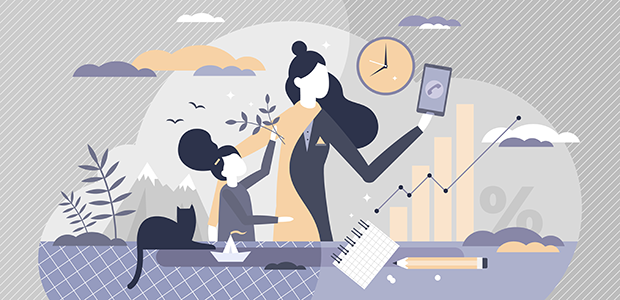
The relationship between mental health, work-life balance and a pandemic
Work-life balance is my lover and spreading its joy with others is one of my reasons for living (we are in a very open relationship, please join). But we’ve not always been so close.
When I was 25 and some way into my communications career, I found myself at the edge of an alluring lake dangerously close to walking in and being devoured by the ever-hungry creatures that live there, the lake being work, and the creatures, the UK’s increasingly demanding work culture.
Seemingly I was doing well, smashing targets, being promoted regularly and receiving great praise, which made it hard for me to accept that I was actually suffering mentally as a result of work-life imbalance.
I felt an urge to supersede expectations at every turn which led to receiving more compliments and more work until one day I had my first panic attack. I found myself sitting window side, next to a stranger on a four-hour train back to Brighton, packed full of standing bodies trying to conceal my internal explosion with nowhere to hide.
We passed through a station at full speed, the blur of people waiting in that moment made me feel so sad tears were streaming. I looked at them but saw myself waiting, wasting my life at work. I looked for a comforting distraction and called my partner, out of breath I asked about his day and when he asked me in return, I hung up.
I never told him why I hung up or anyone at the time about what I had felt that day, but this experience, aligned with a few other major lessons, created a bit of an eclipse situation that shock me to my core, shifting my values and priorities, changing the meaning of success for me and shaping the course of my life.
I still believe in working hard but I’ve given myself permission to do so in balance, in a way that works for me first.
Today, one in six people suffer with mental health issues, and The Mental Health Foundation outed work-life imbalance in the UK as the biggest and most pressing challenge to the mental health of the general population.
The pandemic has exasperated the imbalance for many. A lack of differentiation between working from home and living at work is contributing to increased working hours and in tern, a neglection of key factors that make us resistant and resilient to mental health problems.
Signs of an unhealthy work-life balance
- Feeling unhappy about the time you devote to work
- Neglecting other aspects of your life because of work such as lack of personal development, physical health, relationships and home life
- Feeling depressed, anxious or irritable when working long hours
- Regularly thinking or worrying about work outside of work hours
Why work-life balance is important
Jessica Adams, a cognitive behavioural specialist explains what’s at play: “Creating balance is fundamental for maintaining mental health. Too much of anything, even if it is enjoyable, causes burnout and could lead to anxiety, panic, exhaustion, or depression.
"Without balance, we find ourselves feeling distracted and frustrated causing overall dissatisfaction. This impacts confidence and self-esteem. If work-life balance is not appropriately managed it can create debilitating internal barriers.
“There has been a fundamental shift in the way people work since the pandemic, working from home, heavier workloads due to cutbacks and new safety protocols to name a few. Others may have been forced to pivot or reassess their careers altogether.
"With these added stressors, as well as the uncertainty involved with a global pandemic, people who previously had never suffered with mental health have also been left feeling anxious, distracted or with brain fog.”
How to help yourself
Jessica’s work-life balance advice: “Understanding how the pandemic has affected you on an individual basis is the first important component when thinking about how to manage your situation.
"The other is identifying what the ideal work-life balance looks like for you, not what you think it should look like, or what other people (your boss, family, or peers) ask it to be. This is very individualist and what works for you will be different to everyone else.
“Feeling a sense of understanding for your situation, and clarity on what it needs to look like will help you feel as though you have regained a sense of control.
"This new knowledge of your situation will enable you to start planning and taking intentional action on the areas that you have identified as needing your attention. That in itself will feel liberating, which promotes motivation for change and lastly, action.”


